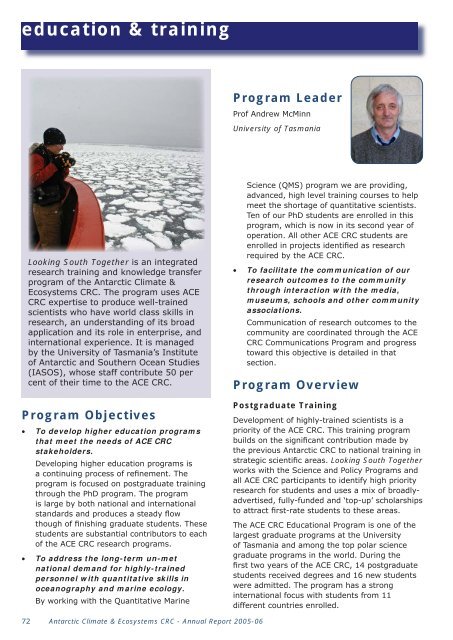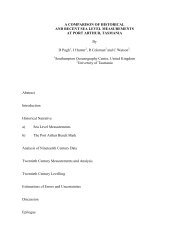Annual report 2005-06.indd - Antarctic Climate and Ecosystems ...
Annual report 2005-06.indd - Antarctic Climate and Ecosystems ...
Annual report 2005-06.indd - Antarctic Climate and Ecosystems ...
You also want an ePaper? Increase the reach of your titles
YUMPU automatically turns print PDFs into web optimized ePapers that Google loves.
education & trainingProgram LeaderProf Andrew McMinnUniversity of TasmaniaLooking South Together is an integratedresearch training <strong>and</strong> knowledge transferprogram of the <strong>Antarctic</strong> <strong>Climate</strong> &<strong>Ecosystems</strong> CRC. The program uses ACECRC expertise to produce well-trainedscientists who have world class skills inresearch, an underst<strong>and</strong>ing of its broadapplication <strong>and</strong> its role in enterprise, <strong>and</strong>international experience. It is managedby the University of Tasmania’s Instituteof <strong>Antarctic</strong> <strong>and</strong> Southern Ocean Studies(IASOS), whose staff contribute 50 percent of their time to the ACE CRC.Program Objectives• To develop higher education programsthat meet the needs of ACE CRCstakeholders.Developing higher education programs isa continuing process of refinement. Theprogram is focused on postgraduate trainingthrough the PhD program. The programis large by both national <strong>and</strong> internationalst<strong>and</strong>ards <strong>and</strong> produces a steady flowthough of finishing graduate students. Thesestudents are substantial contributors to eachof the ACE CRC research programs.• To address the long-term un-metnational dem<strong>and</strong> for highly-trainedpersonnel with quantitative skills inoceanography <strong>and</strong> marine ecology.By working with the Quantitative MarineScience (QMS) program we are providing,advanced, high level training courses to helpmeet the shortage of quantitative scientists.Ten of our PhD students are enrolled in thisprogram, which is now in its second year ofoperation. All other ACE CRC students areenrolled in projects identified as researchrequired by the ACE CRC.• To facilitate the communication of ourresearch outcomes to the communitythrough interaction with the media,museums, schools <strong>and</strong> other communityassociations.Communication of research outcomes to thecommunity are coordinated through the ACECRC Communications Program <strong>and</strong> progresstoward this objective is detailed in thatsection.Program OverviewPostgraduate TrainingDevelopment of highly-trained scientists is apriority of the ACE CRC. This training programbuilds on the significant contribution made bythe previous <strong>Antarctic</strong> CRC to national training instrategic scientific areas. Looking South Togetherworks with the Science <strong>and</strong> Policy Programs <strong>and</strong>all ACE CRC participants to identify high priorityresearch for students <strong>and</strong> uses a mix of broadlyadvertised,fully-funded <strong>and</strong> ‘top-up’ scholarshipsto attract first-rate students to these areas.The ACE CRC Educational Program is one of thelargest graduate programs at the Universityof Tasmania <strong>and</strong> among the top polar sciencegraduate programs in the world. During thefirst two years of the ACE CRC, 14 postgraduatestudents received degrees <strong>and</strong> 16 new studentswere admitted. The program has a stronginternational focus with students from 11different countries enrolled.72 <strong>Antarctic</strong> <strong>Climate</strong> & <strong>Ecosystems</strong> CRC - <strong>Annual</strong> Report <strong>2005</strong>-06








